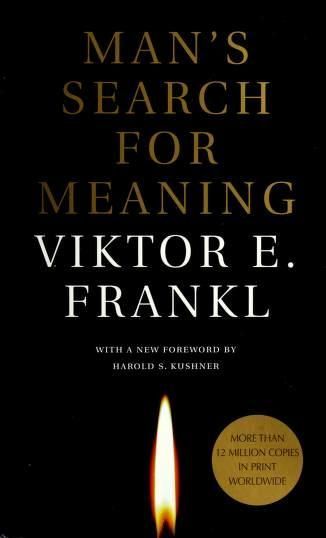
Man's Search for Meaning
This author's memoir has riveted generations of readers with its descriptions of life in Nazi death camps and its lessons for spiritual survival. Based on his own experience and the stories of his patients, he argues that we cannot avoid suffering but we can choose how to cope with it, find meaning in it, and move forward. At the heart of his theory, known as logotherapy, is a conviction that the primary human drive is not pleasure but the pursuit of what we find meaningful. This book has become one of the most influential books in America; it continues to inspire us all to find significance in the very act of living.
Reviews
Raadeem Pierre@raadeem
Roseanne@croissaintwink
Bailey Scott@baileybos
catto fishu@catfish-lo
drowsydove@drowsy-dove
Natasha Mok@natamok
Timeo Williams@timeowilliams
Reiza H@rererei93
Elisavet Rozaki @elisav3t
elizabeth@ekmclaren
Ankit Panchal@ankit0404
siegs@siegs
maitha mana@maithalikesapplepies
Ali Angco@aliangco
Q@qontfnns
gabby@snoopygabster
ahmed@ahmd
Rithwik Jayasimha@rithwik
Sarah Panek@sarahpanek
Joshua Edward Gibson-Altrock@jeg_a
Marga Camps@margacamps
Xin Ma@xym
Jonah Kohei Foss@jonah
Jamshid@gladuz
Highlights
Martyna Melania Anastasia@bambs
Martyna Melania Anastasia@bambs
Martyna Melania Anastasia@bambs
Martyna Melania Anastasia@bambs
Martyna Melania Anastasia@bambs
Martyna Melania Anastasia@bambs
Martyna Melania Anastasia@bambs
Martyna Melania Anastasia@bambs
Francesco@fradeve
Page 88
Francesco@fradeve
Page 84
Francesco@fradeve
Page 59
Ali Angco@aliangco
Magaly Belmontes@magalybelmon
Sudhanva Paturkar@elevated
NF@tabisyndrome
Page 103
Laura Mei@thelibrariansnook
Page 123
Laura Mei@thelibrariansnook
Page 98
Laura Mei@thelibrariansnook
Page 74
Laura Mei@thelibrariansnook
Page 70
windy@windy
Page 118
jenna de nobrega @jennasliteral
Page 11
Edward Steel@eddsteel
Edward Steel@eddsteel
Edward Steel@eddsteel